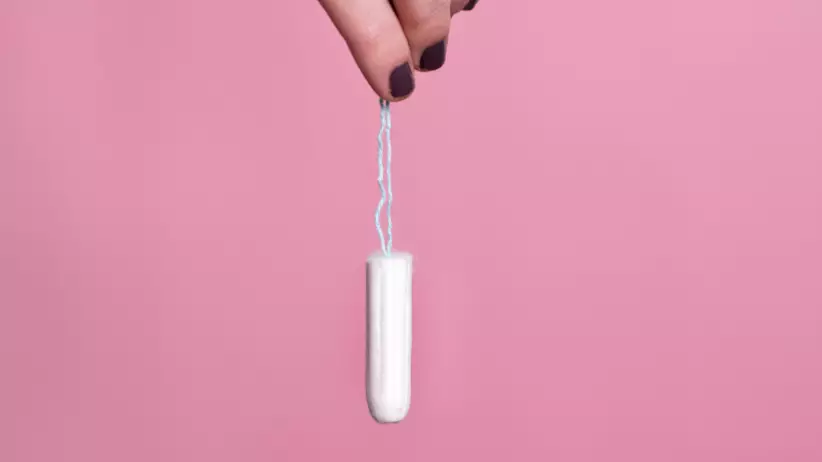
Let's not beat around the bush: coronavirus has been tough on all of us. From lockdowns and curfews to fears for our loved ones, there are few who haven't been affected by the pandemic in one way or another.
And in case that wasn't bad enough, many women are now reporting their periods are worse than usual, too.
Just a scroll through social media and there's flurries of women questioning just what is going on with their bodies.
Advert
"So This #Coronavirus Is Delaying My Menstrual Cycle Too?," one women wrote on Twitter as the pandemic took hold.
As another penned: "[I've] never had my period like this before, just had to put 3 pads on, this pandemic is not only messing with my mind but also my whole body".
A third joked: "Covid anxiety really has turned my menstrual cycle into a bully who thinks it can just show up DAYS LATE??!"

Speaking to Tyla Sarah*, 26, said her period cramps had intensified drastically over the last month, to the point where she's had to take multiple sick days to cope with the pain.
Advert
On top of that, her periods have been irregular since around April - often arriving as much as a week later than they should, and heavier as a result.
"My periods seem to be on their own schedule at the moment," she says. "And my cramps have been so bad I've not been able to get out of bed. You can forget concentrating on anything else.
"It's bizarre because I never normally experience painful periods but at the moment they're another level".
Thirty-one-year-old Anna* agrees: "I've been lucky enough to have regular periods my whole life, arriving pretty much bang on every 28 days. But over the past few months they've been all over the place, with unusually heavy bleeding. It's not just unpredictable, but can be extremely distressing, too."
Advert
So, what's causing everyone's periods to worsen? Dr Shree Datta says it may well be a secondary affect of the pandemic.
"Whilst the evidence around the pandemic's effects on periods is limited, there is no doubt that several environmental factors can affect periods," Intimina's resident gynaecologist tells Tyla.
"Some studies suggest that in particular, stress can affect the regularity of your periods or cause them to stop. It's [also] possible that if you miss a period, your next period may be heavier."

The absence of periods is called amenorrhea, and is known to occur when people go through trauma or stressful situations.
Advert
Explaining this phenomenon, and why some periods may be late or feel different to normal, Dr Datta says: "Stress can affect your hormonal regulation - specifically those in the brain".
To break it down a little further, stress activates the hypothalamic-pituitary-adrenal (HPA) axis - a hormonal pathway which releases cortisol.
Therefore, when you're overly stressed, this can lead to an excess of cortisol in your body, which can in turn prompt abnormal ovulation, a disruption in your cycle or even no period at all.
Advert
"Environmental changes which can influence your periods include your job, diet, weight, lifestyle factors and exercise," Dr Datta adds.

Of course, while many of these, such as jobs and lifestyle factors, can directly cause stress - especially in a pandemic when we have less control over them - it's not just the cortisol playing with our cycles.
For instance, she adds, a high BMI (caused by lack of exercise or weight gain) "can also impact on the levels of testosterone, oestrogen and insulin in your blood. These hormones can affect the regularity of your periods and potentially your menstrual flow."
Research also shows that being stressed could also cause painful menstruation - which is known as dysmenorrhea.
In fact, a 2004 study into period pains found that "the risk of dysmenorrhoea was more than twice as great among women with high stress compared to those with low stress in the preceding cycle".
Now if a global pandemic isn't a 'high stress' situation we don't know what is...
Discussing what we can do to limit these negative effects, Dr Datta says: "Acknowledging stress and monitoring your periods is the first step, so that you can identify the impact it is having on your menstrual cycle.
"Your menstrual cycle can be a reflection of your overall reproductive health, and a key indicator of any underlying stress.

"Consider (or reconsider) factors which can improve your health overall - regular exercise, a healthy balanced diet and good sleep hygiene for example."
She warns: "Don't assume any change in your periods is simply down to the pandemic or stress - if these changes persist, it's a good idea to consult your doctor to make sure an underlying medical problem has not developed."
"There can be several medical reasons which can develop over time - for example, if you develop fibroids or polyps in your womb or if your thyroid is not working correctly.
"Another cause can be polycystic ovary syndrome which can affect the length of your cycle as well as the duration and heaviness. Endometriosis or infection can also cause period and tummy pains."
The good news is that if it is the pandemic making you stressed or affecting your physical health, thus affecting your period, it's not a permanent change.
"If [the stressor] is temporary, your period should get back to normal over time," she says.
*Names have been changed to keep contributors anonymous
Topics: Periods, Coronavirus, health news, Health, Covid-19